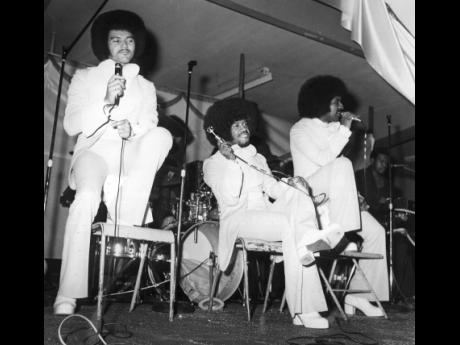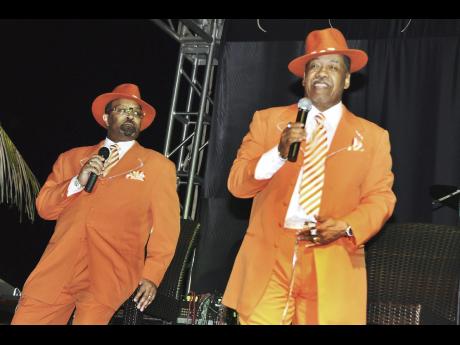The Music Diaries | The Chi-lites maintain Jamaican appeal
'The older the moon, the brighter it shines', is an old adage that the Manhattans proved to be true during a scintillating performance at the Startime Show which took place at the National Arena on Saturday, July 8.
In an unforgettable experience, they all but set the National Arena ablaze as fans danced, jumped, and gyrated hysterically to the music of the group that was made as far back as 45 years ago when lead vocalist Gerald Alston, joined them in 1972. Such was the originality of the sound that came across, especially from Alston, that it left fans wondering whether they were listening to the actual recording of the song or to a live performance.
In an almost endless flow, the group reeled off hits like, We Never Danced To A Love Song, There's No Me Without You, You Are My Shining Star, Just One Moment Away and Kiss and Say Goodbye, which left the fans begging for more. It was the third time in 11 years (having been here previously in 2006 and 2014) that the Manhattans were visiting Jamaican for a stage show.
But as exciting and as homely as the Manhattans may be, The Chi-Lites, their contemporaries, perhaps had a more grand Jamaican appeal, especially among females.
Many may recall the opening lines for Homely Girl, which says:
"It must have broke your poor little heart
When the boys used to say, you look better in the dark,
But now they'd give all they learnt in school
To be somewhere in the dark with you
Homely girl, you used to be so lonely."
However, the group's most popular recording worldwide has to be the 1972 chart-topping number one single Oh Girl, written and led by Eugene Record. When it was released in that year, it had almost the entire world singing:
"Oh girl, I'd be in trouble if you left me now
'Cause I don't know where to look for love
I just don't know how.
Oh girl, how I depend on you
To give me love when I need it,
Right on time, you would always be."
Unlike their contemporaries, who hailed from the sweet strings-laden soul cities of Memphis and Philadelphia, The Chi-lites were formed in Chicago, a town better know for its driving R&B and urban blues. The bluesy sound that is detected in recordings like It's Time For Love, Here I Am, Stoned Out Of My Mind, and Living In The Footsteps of Another Man was consistent with their hometown.
Originally the Hi-lites
Born from the marriage of two vocal groups in the late 1950s, The Chi-lites were originally a quintet known as the Hi-lites, consisting of Eugene Record, Robert Lester, Clarence Johnson, Creadel Jones, and Marshall Thompson. Johnson's stay was, short-lived, however and so, operating as a quartet, they recorded a few undistinguished recordings for various labels.
In 1964, they prefixed a 'C' to their title thus becoming The Chi-lites. Four years later, they signed to Brunswick, the label that would break them on the international scene. Early in 1969, Give It Away became their first national R&B hit for the label. But it was, Have You Seen Her in 1971, written by Record and his wife Barbara Acklin, that became the first in a string of slow romantic and up-tempo ballads that shot the group to prominence in a four-year blitz. Utilising a falsetto style of group harmonising, they were at their best as they sang in unison:
"Oh I see her face everywhere I go
On the streets and even at the picture show
Have you seen her, tell me have you seen her."
With songs like these, the group won more Jamaican hearts than any other group of that period.
Other big hits by the group included Marriage License, Too Good To Be Forgotten, The Coldest Days Of My Life, Lonely Man, Half A Love, A Letter To Myself, and You Got To Be The One.
The group also had a number of recordings that echoed the political slogan of the Black Power movement. They included, Give More Power To The People and There Will Never Be Any Peace.
Breaking into the British Top 10 charts on a number of occasions, the group continued to make hits during the 1970s but experienced a couple obstacles with the demise of Brunswick and the departure of their inspirational leader, Eugene Record, for a solo career. He, however, returned in 1980 for a reunion album. Thereafter, they had moderate success with Changing For You - a minor British hit in 1983. The group made its last appearance on the US R&B charts in 1984 with Gimme Whatcha Got.


